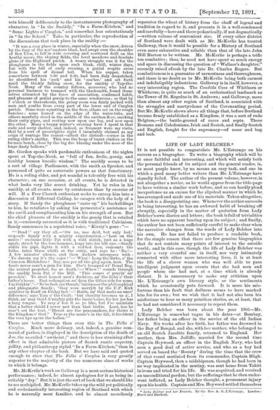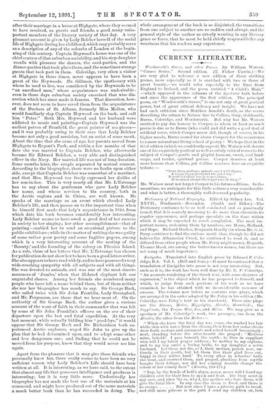LIFE OF LADY BELCHER.*
IT is not possible to congratulate Mr. L'Estrange on his success as a biographer. To write a biography which will be at once faithful and interesting, and which will satisfy both the personal friends of its subject and the general reader, is, as most people know, by no means an easy task, and one in which a good many better writers than Mr. L'Estrange have signally failed. The author of the present volume, however, is not altogether a novice, as he would appear from the title-page to have written a similar work before, and so can hardly plead inexperience as an excuse for the slipshod manner in-which he. has arranged and made use of his materials. Taken altogether, the book is a disappointing one. Whenever the author succeeds in being interesting, he has an awkward habit of breaking oft abruptly, especially in the matter of quotation from Lady Belcher's own diaries and letters ; the book is full of trivialities which have no apparent bearing upon its subject ; and finally, the author has not been sufficiently careful to make clear when the narrative changes from the words of Lady Belcher into his own. He has not failed to produce a readable book, for the simple reason that there are few genuine biographies that do not contain many points of interest to the outside world; and in this case, though the life of Lady Belcher was neither a very eventful one in itself, nor very intimately connected with other more interesting lives, it is at least the life of a clever woman who was well able to pass- intelligent judgment upon events that she had seen and people whom she had met, at a time which is already distant. It is unnecessary to make any criticism upon Mr. L'Estrange's own literary style,- or the sentiments- which he occasionally puts forward. It is more his mis- fortune than his fault that dullness seems to have marked him for its own ; but we wish that it had not also been his misfortune to hear so many pointless stories, or, at least, that he had not considered it necessary to repeat them.
Lady Belcher was born about the year 1805—Mr. L'Estrange is somewhat vague in his dates—at Bombay, her father being an officer in the service of the old Indian Navy. Six weeks after her birth, her father was drowned in the Bay of Bengal, and she, with her mother, who belonged to an old Scotch Jacobite family, returned to England. Her mother, then Mrs. Jolliffe, married for the second time Captain Heywood, an officer in the English Navy, who had seen a good deal of active service, and who as a boy had served on board the ' Bounty' during the time that the crew of that vessel mutinied from its commander, Captain Bligh. Captain Heywood, then a midshipman, though he had been in no way implicated in the mutiny, was sent home from Tahiti in irons and tried for his life. He was acquitted, and received an unconditional pardon; but the sufferings that he then under- went inflicted, as Lady Belcher thought, a permanent injury upon his health; Captain and Mrs. Heywood settled themselves
• Lad Belch and her Friends. By the Rev. A. G. L'Estrange. London after their marriage in a house at Highgate, where they seemed to have received, as guests and friends, a good. many unim- portant members of the literary society of that day. A very pleasant account is given by Lady Belcher herself of the social life of Highgate during her childhood, which may probably serve as a description of any of the suburbs of London at the begin- ning of this century. Captain Heywood's house was one of the chief centres of that suburban sociability, and his step-daughter recalls with pleasure the dances, the card-parties, and the dinner-parties that took place there, and the sometimes strange guests that took part in them. Coleridge, very often a visitor at Highgate in those times, never appears to have been a guest of the Heywoods. Mr. Gillman, the apothecary with whom he used to live, was considered by the Heywoods to be "an unrefined man," whose acquaintance was undesirable : even in those days suburban society exercised that wise dis- cretion which has since made it famous. That discretion, how- ever, does not seem to have saved them from the acquaintance of. the Duchess of St. Albans, formerly Miss Mellon, who would familiarly slap Captain Heywood on the back, and call him " Peter." Both Mrs. Heywood and her husband were addicted to music and painting—Captain Heywood was the earliest patron of Stanfield, the great painter of sea-pieces- and it was probably owing to their care that Lady Belcher became not only a good musician, but an artist of some merit. About the time that she came of age, her parents moved from Highgate to Regent's Park, and within a few months of that date she was married to Captain Belcher, who afterwards became Sir Edward Belcher, a very able and distinguished officer in the Navy. Her married life was not of long duration. Some months later, the couple separated by mutual consent. According to the biographer, there were no faults upon either side, except that Captain Belcher was somewhat of a martinet, and that Mrs. Heywood too freely expressed her dislike of her son-in-law. This is very nearly all that Mr. L'Estrange has to say about the gentleman who gave Lady Belcher her name, and whose services to his country, both in the Arctic regions and in China, are well known. He speaks of the marriage as an event which clouded Lady Belcher's life, and then passes on to the important time when be himself first made that lady's acquaintance in 1840, from which date his book becomes considerably less interesting. Lady Belcher seems to have owed a good deal of her success in society to her singing ; her other accomplishment—that of painting—enabled her to send an occasional picture to the public exhibitions ; while in the matter of writing she was guilty -of some rather poor poetry and some fugitive papers, among which is a very interesting account of the mutiny of the 4Bounty,' and the founding of the colony on Pitcairn Island. As a rule, those of her letters that Mr. L'Estrange has chosen for publication do not show her to have been a good letter-writer. She also appears to have read widely, and to have possessed a very wide-reaching sympathy with all subjects and with all things. She was devoted to animals, and was one of the most sincere mourners of Jumbo,' when that ill-fated elephant left our ungrateful shores. Among her friends she numbered many people who have left a name behind them, but of them neither she nor her biographer has much to say. Sir George Back, who sailed twice with Sir John Franklin, Lady Strangford, and Mr. Fergusson, are those that we hear most of. On the authority of Sir George Back, the author gives a curious account of the want of faith in their commander that was felt by some of Sir John Franklin's officers on the eve of their departure upon the last and fatal expedition. At the very last moment, while actually bidding him "good-bye," it would appear that Sir George Back and Dr. Richardson both ex- perienced Arctic explorers, urged Sir John to give up the plan that he had determined upon, and to adopt some other and less dangerous one; and finding that he could not be moved from his purpose, knew that they would never see him again.
Apart from the pleasure that it may give those friends who personally knew her, there really seems to have been no very sufficient reason why Lady Belcher's Life should have been written at all. It is interesting, as we have said, to the extent that almost any life that possesses intelligence and goodness is interesting : but it is very little more. Undoubtedly her biographer has not made the best use of the materials at his command, and might have produced out of the same materials a much better book than he has succeeded in doing. The whole arrangement of the book is so disjointed, the transitions from one subject to another are so sudden and abrupt, and the general style of the author so utterly wanting in any literary grace or force, that he must be held chiefly responsible for any weariness that his readers may experience.



































 Previous page
Previous page